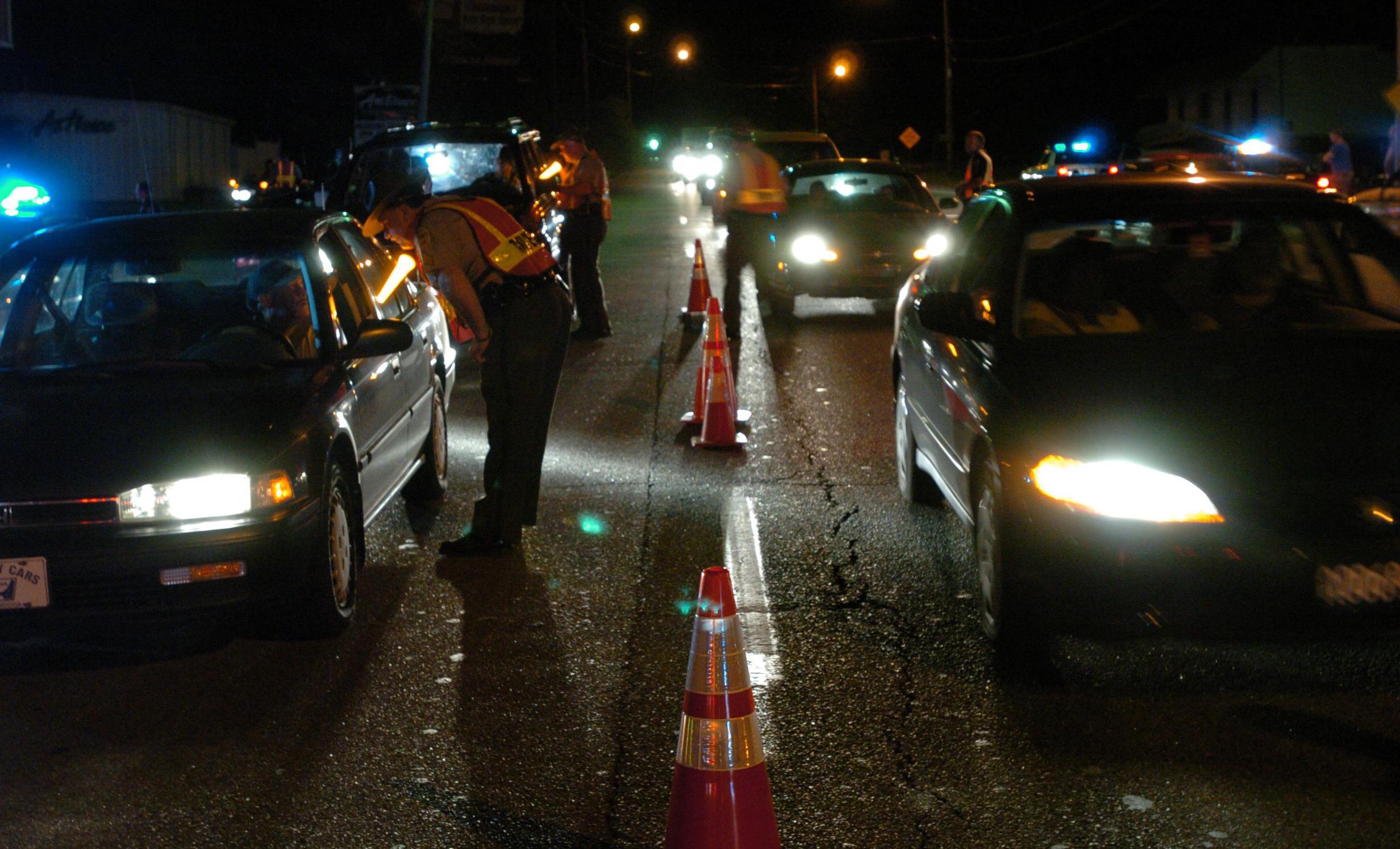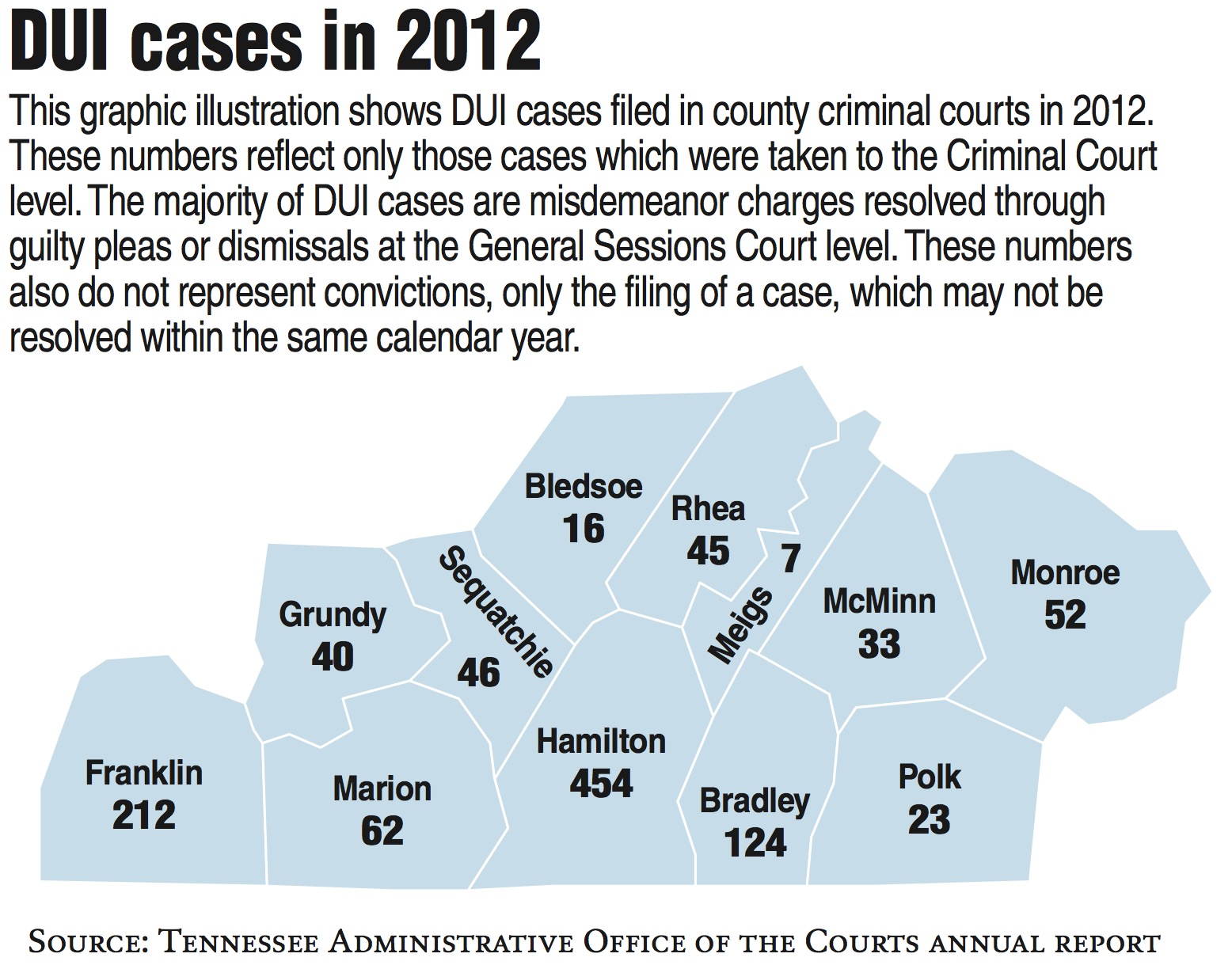VIDEO
This story is featured in today's TimesFreePress newscast.
Recent state and national changes to how evidence is collected in drunken-driving cases could mean as many as 3,000 more DUI convictions in Tennessee each year.
And that will mean safer roads, said the state's lead prosecutor who works on traffic and DUI training for the Tennessee Highway Patrol.
"More convictions, less fatalities," said Tom Kimball, traffic safety resource prosecutor for the Tennessee District Attorneys General Conference.
Of the 1,014 traffic fatalities on Tennessee roads last year, 355 involved alcohol, drugs or both, according to Department of Safety data.
Effective Monday, streamlined state laws governing how police and attorneys handle DUI cases went into effect. The package of laws was the result of efforts begun in 2006 under then-Gov. Phil Bredesen through current Gov. Bill Haslam.
Most of the change in DUI law affects the arrest. Drivers stopped by police used to be able to refuse sobriety tests or blood draws unless they killed or injured someone.
"If someone denied a test, it was over," Kimball said.
Most drivers who refused to give a breath or blood sample when stopped previously have been convicted of a DUI and know the blood test is strong evidence against them, he said.
But last year, state law was broadened. Suspected drunken drivers now are prohibited from refusing to give a blood sample if the driver kills or injures someone, has a previous DUI conviction or has a passenger younger than 16.
In April, the U.S. Supreme Court ruled that law enforcement could collect blood samples from suspected drunken drivers in cases where getting a warrant would compromise evidence.
The high court's decision helped reveal Tennessee's out-of-date warrant system, Kimball said.
"We still use the same system as in 1871," Kimball said, calling Tennessee's DUI laws that require an officer to get a warrant -- in person -- for a blood draw antiquated. The process, which requires that a magistrate review the petition for a warrant in person, causes critical delays in getting evidence, specifically in DUI cases where the main evidence -- alcohol in blood -- disappears as each minute passes.
Still, warrantless blood draws worry defense attorney Johnny Houston. Although he respects the goal -- keeping the public safe by reducing the number of drunken drivers -- he is concerned about the broader effects of the new law.
"We have to be careful, even though the overall purpose is good, we don't erode rights," Houston said.
Kimball said the Tennessee blood sample changes will serve as a wake-up call for some drunken drivers. The blood-alcohol content percentage tells DUI suspects exactly how much the alcohol was affecting them. Without such specific evidence, defendants often justify fighting the conviction, denying a level of responsibility, he said.
But Houston said that having a competent defense attorney scrutinize not only the evidence but how it is gathered is crucial to protecting clients' rights.
"There are some instances where you can watch the video and can conclude that the officer didn't have a reason to even arrest them for DUI, much less have probable cause to even take their blood," Houston said.
Hamilton County Assistant District Attorney Kate Lavery prosecutes felony DUI cases for the local office. Without a blood-alcohol sample for jurors to see the level of impairment, prosecutions were much more difficult.
She and others would have to rely on officer testimony and sometimes video footage from patrol cars during field sobriety tests.
But, Lavery said, many repeat offenders who had high levels of alcohol in their systems could perform sobriety tests with ease, appearing sober on camera though the alcohol levels in the blood might test at twice the legal limit of 0.08, or higher.
The mandatory blood draw change in 2012 was news to some.
"It came as a shock to the multiple offenders," Lavery said.
Though the prosecutor didn't have specific figures since the law change, she said no repeat offender cases she's prosecuted had a blood level lower than 0.17.
Lavery advises police to get a warrant in every situation where they need to get a blood sample, even on first-offense DUI suspects. The Supreme Court decision in April showed that waiving a warrant on all cases was not constitutional and could only be done in certain circumstances. By following the warrant procedure when possible she hopes to keep evidence intact and bring that to court, strengthening her case.
Sgt. Chris Dye trains troopers at the Tennessee Highway Patrol on new laws and equipment for traffic safety and DUIs.
Cadets at the Safety Department training center receive 48 hours of training in DUI procedures, said the 12-year highway patrol veteran.
Some places, such as Hamilton County, have a magistrate available around the clock. But in many rural districts the judge who would review and grant a warrant might not be available immediately or could be in another county, an hour's drive away, Dye said.
"If you don't obtain that evidence in a short period of time, then that evidence is gone and lost forever," Dye said.
Contact staff writer Todd South at tsouth@timesfree press.com or 423-757-6347. Follow him on Twitter @tsouthCTFP.


